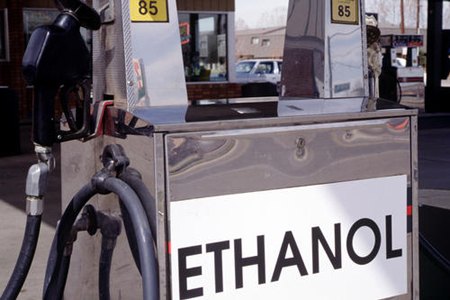Corn-to-Ethanol Industry Has Peaked
TTAC prides itself on scanning obscure sources of info to keep you inside the loop on some loopy, car-related stuff. And nothing is quite as bizarre as America's corn-based ethanol industry, depending as it does entirely on government subsidies, mandates and market manipulation. One of the best sources for info: industrialinfo.com. In an "interview" with an endlessly annoying, pig-ignorant, honey-toned professional broadcaster, the news org's Alternative Fuel Group Veep offers a blunt assessment of a bio-diesel and ethanol industry deep in the doldrums. "We're in a bust cycle," Jay Brunson says. "Over the first part of 2008, not a single corn-based ethanol plant has started construction, and the biodiesel industry has had only a handful of construction starts." And then Jay moves quickly on to non-corn ethanol sources. Does this mean U.S. farmers are, you know? Not if their legislators have anything to say about it. And by God, they do.
More by Robert Farago


































Comments
Join the conversation
I haven't done the research to confirm, but suspect that corn ethanol has a real, though unacknowledged, role as the cheapest source of high octane fuel stock available (blended at 10%) in an era when light, sweet crudes are getting scarce.. For one thing, I don't think the agriculture lobby has the power to take 10% of the gasoline business from the petroleum lobby. The stated reasons to either boost the Iowa/other Midwest farm economy or help the environment lack the ring of truth.
TINSTAAFL
i want to buy ethanol free gasoline in PA or NJ. I cant find it.
Louisiana Enacts the Most Comprehensive Advanced Biofuel Legislation in the Nation __________________ Advanced Biofuel Industry Development Initiative Benefits Consumers, Farmers and Gas Station Owners with Localized “Field-to-Pump” Strategy Baton Rouge, LA (September 19, 2008) – Governor Bobby Jindal has signed into law the Advanced Biofuel Industry Development Initiative, the most comprehensive and far-reaching state legislation in the nation enacted to develop a statewide advanced biofuel industry. Louisiana is the first state to enact alternative transportation fuel legislation that includes a variable blending pump pilot program and a hydrous ethanol pilot program. Field-to-Pump Strategy The legislature found that the proper development of an advanced biofuel industry in Louisiana requires implementation of the following comprehensive “field-to-pump” strategy developed by Renergie, Inc.: (1) Feedstock Other Than Corn (a) derived solely from Louisiana harvested crops; (b) capable of an annual yield of at least 600 gallons of ethanol per acre; (c) requiring no more than one-half of the water required to grow corn; (d) tolerant to high temperature and waterlogging; (e) resistant to drought and saline-alkaline soils; (f) capable of being grown in marginal soils, ranging from heavy clay to light sand; (g) requiring no more than one-third of the nitrogen required to grow corn, thereby reducing the risk of contamination of the waters of the state; and (h) requiring no more than one-half of the energy necessary to convert corn into ethanol. (2) Decentralized Network of Small Advanced Biofuel Manufacturing Facilities Smaller is better. The distributed nature of a small advanced biofuel manufacturing facility network reduces feedstock supply risk, does not burden local water supplies and provides for broader based economic development. Each advanced biofuel manufacturing facility operating in Louisiana will produce no less than 5 million gallons of advanced biofuel per year and no more than 15 million gallons of advanced biofuel per year. (3) Market Expansion Advanced biofuel supply and demand shall be expanded beyond the 10% blend market by blending fuel-grade anhydrous ethanol with gasoline at the gas station pump. Variable blending pumps, directly installed and operated at local gas stations by a qualified small advanced biofuel manufacturing facility, shall offer the consumer a less expensive substitute for unleaded gasoline in the form of E10, E20, E30 and E85. Pilot Programs (1) Advanced Biofuel Variable Blending Pumps - The blending of fuels with advanced biofuel percentages between 10 percent and 85 percent will be permitted on a trial basis until January 1, 2012. During this period the Louisiana Department of Agriculture and Forestry Division of Weights & Measures will monitor the equipment used to dispense the ethanol blends to ascertain that the equipment is suitable and capable of producing an accurate measurement. (2) Hydrous Ethanol - The use of hydrous ethanol blends of E10, E20, E30 and E85 in motor vehicles specifically selected for test purposes will be permitted on a trial basis until January 1, 2012. During this period the Louisiana Department of Agriculture and Forestry Division of Weights & Measures will monitor the performance of the motor vehicles. The hydrous blends will be tested for blend optimization with respect to fuel consumption and engine emissions. Preliminary tests conducted in Europe have proven that the use of hydrous ethanol, which eliminates the need for the hydrous-to-anhydrous dehydration processing step, results in an energy savings of between ten percent and forty-five percent during processing, a four percent product volume increase, higher mileage per gallon, a cleaner engine interior, and a reduction in greenhouse gas emissions. Act No. 382, entitled “The Advanced Biofuel Industry Development Initiative,” was co-authored by 27 members of the Legislature. The original bill was drafted by Renergie, Inc. Representative Jonathan W. Perry (R - District 47), with the support of Senator Nick Gautreaux (D - District 26), was the primary author of the bill. Reflecting on the signing of Act No. 382 into law, Brian J. Donovan, CEO of Renergie, Inc. said, “I am pleased that the legislature and governor of the great State of Louisiana have chosen to lead the nation in moving ethanol beyond being just a blending component in gasoline to a fuel that is more economical, cleaner, renewable, and more efficient than unleaded gasoline. The two pilot programs, providing for an advanced biofuel variable blending pump trial and a hydrous ethanol trial, established by the State of Louisiana should be adopted by each and every state in our country.” State Agencies Must Purchase or Lease Vehicles That Use Alternative Fuels Louisiana’s Advanced Biofuel Industry Development Initiative further states, “The commissioner of administration shall not purchase or lease any motor vehicle for use by any state agency unless that vehicle is capable of and equipped for using an alternative fuel that results in lower emissions of oxides of nitrogen, volatile organic compounds, carbon monoxide, or particulates or any combination thereof that meet or exceed federal Clean Air Act standards.” Advanced Biofuel Price Preference for State Agencies Louisiana’s Advanced Biofuel Industry Development Initiative provides that a governmental body, state educational institution, or instrumentality of the state that performs essential governmental functions on a statewide or local basis is entitled to purchase E20, E30 or E85 advanced biofuel at a price equal to fifteen percent (15%) less per gallon than the price of unleaded gasoline for use in any motor vehicle. Economic Benefits The development of an advanced biofuel industry will help rebuild the local and regional economies devastated as a result of hurricanes Katrina and Rita by providing: (1) increased value to the feedstock crops which will benefit local farmers and provide more revenue to the local community; (2) increased investments in plants and equipment which will stimulate the local economy by providing construction jobs initially and the chance for full-time employment after the plant is completed; (3) secondary employment as associated industries develop due to plant co-products becoming available at a competitive price; and (4) increased local and state revenues collected from plant operations will stimulate local and state tax revenues and provide funds for improvements to the community and to the region. “Representative Perry and Senator Gautreaux have worked tirelessly to craft comprehensive advanced biofuel legislation which will maximize rural development, benefit consumers, farmers and gas station owners while also protecting the environment and reducing the burden on local water supplies,” said Donovan. “Representative Perry, Senator Gautreaux, and Dr. Strain, Commissioner of the Louisiana Department of Agriculture and Forestry, should be praised for their leadership on this issue.” About Renergie Renergie was formed on March 22, 2006 for the purpose of raising capital to develop, construct, own and operate a network of ten ethanol plants in the parishes of the State of Louisiana which were devastated by hurricanes Katrina and Rita. Each ethanol plant will have a production capacity of five million gallons per year (5 MGY) of fuel-grade ethanol. Renergie’s “field-to-pump” strategy is to produce non-corn ethanol locally and directly market non-corn ethanol locally. On February 26, 2008, Renergie was one of 8 recipients, selected from 139 grant applicants, to share $12.5 million from the Florida Department of Environmental Protection’s Renewable Energy Technologies Grants Program. Renergie received $1,500,483 (partial funding) in grant money to design and build Florida’s first ethanol plant capable of producing fuel-grade ethanol solely from sweet sorghum juice. On April 2, 2008, Enterprise Florida, Inc., the state’s economic development organization, selected Renergie as one of Florida’s most innovative technology companies in the alternative energy sector. By blending fuel-grade ethanol with gasoline at the gas station pump, Renergie will offer the consumer a fuel that is more economical, cleaner, renewable, and more efficient than unleaded gasoline. Moreover, the Renergie project will mark the first time that Louisiana farmers will share in the profits realized from the sale of value-added products made from their crops.